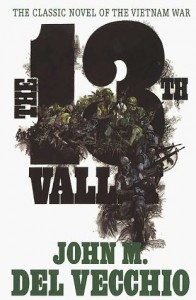 Disclaimer: I read this book in the Dutch translation
Disclaimer: I read this book in the Dutch translation
The 13th Valley by John Del Vecchio has been called the classic Vietnam novel. Other classic books (e.g. Dispatches by Michael Herr, The Things They Carried by Tim O’Brian, Chickenhawk by Robert Mason) were first-hand accounts, although O’Brian often crosses the line between reality and fiction. I knew of its existence, but didn’t read it until stumbling upon it in the second-hand book corner of the War & Resistance Museum in Rotterdam.
The book is written from the view of James Chelini, a soldier just arriving from the States, Daniel Egan, an experienced sergeant just returned from R&R, with only a month of duty left in Vietnam, and the black company commander, Lieutenant Brooks.
The first chapters showcase Del Vecchio’s writing style. Without too many words or flowery language, he manages to describe a clear picture of the dusty camp, the heat, the smell, and the general atmosphere. I immediately felt deeply immersed and could paint a picture of the situation in my mind.
The story background is Operation Texas Star in the Khe Tao Valley, an important NVA supply route close to the Laotian Border (in reality, Texas Star took place in the A Shau Valley). The battalion is dropped around the valley with the goal of finding and destroying the enemy. Alpha company, the company of the three protagonists, is the roving element inside the valley that looks for the enemy HQ. The fighting and Brooks’s guerilla tactics are described in an excellent manner, and I gained more insight into infantry tactics from this book than from any other book about the Vietnam War.
The 13th Valley, however, is more than a description of infantry fighting. Without descending into stereotypes, it covers the issue of racial tension, of relationship problems, and, in the discussion of Lt. Brooks with his men, the question of why wars exist and are fought. This is also addressed by Karl Marlantes in Matterhorn (and further in his non-fiction book What it is like to go to War), but at a personal level. In this, books about the Vietnam War clearly differ from books about World War II, were (at least from an American perspective) there was a clear justification for the war. As such, I feel that we can learn more from the Vietnam War than from WWII.
Highly recommended reading, a 30th anniversary edition was published in 2012.